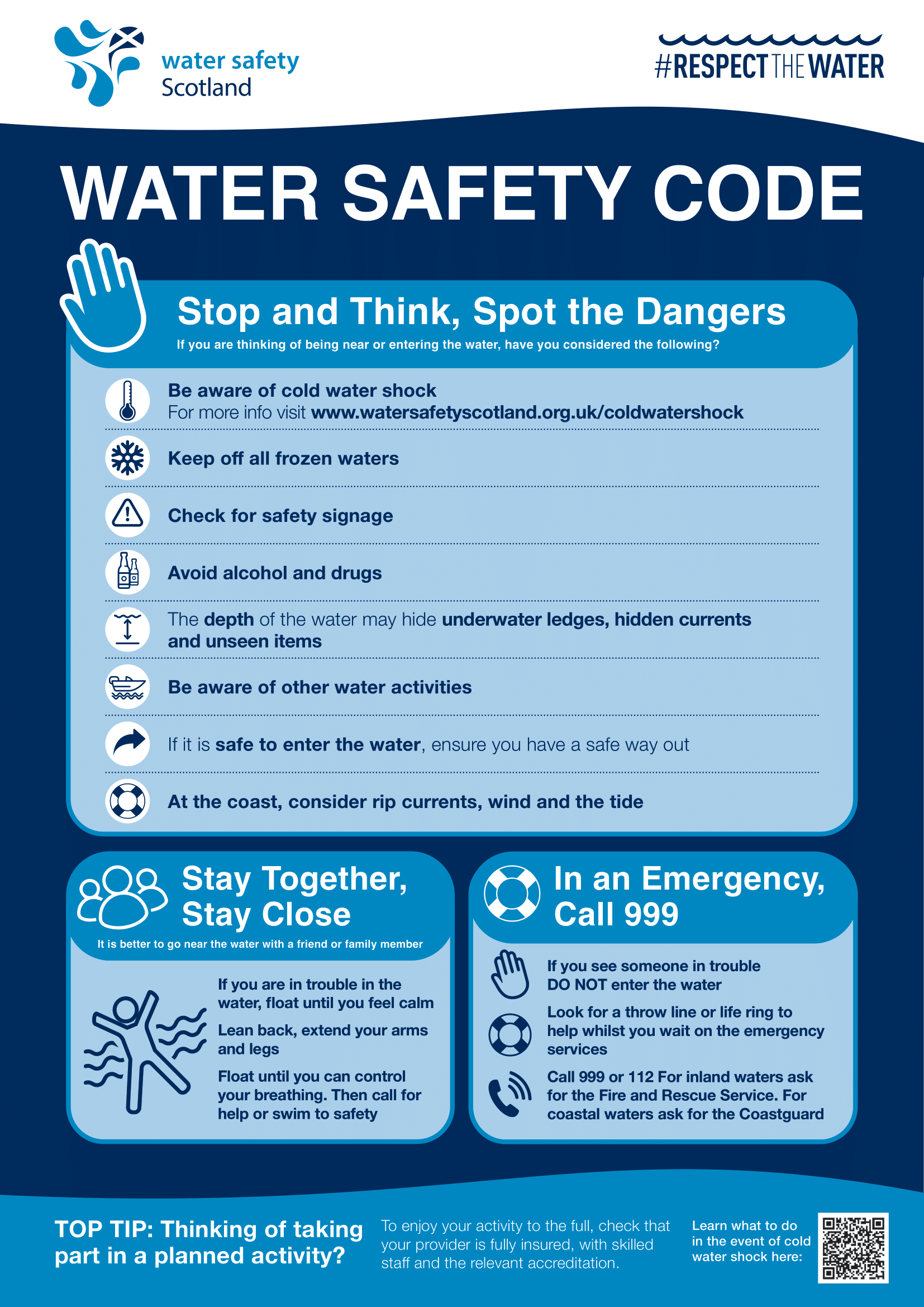This article will share some tips, including advice from the Royal National Lifeboat Institution (RNLI) and Water Safety Scotland, on how to stay safe in and around water.
Water Safety Scotland have created the Water Safety Code to give you the information you need to help keep yourself and others safe around water.
The Water Safety Code

Stop and Think, Spot the Dangers
If you are thinking of being near or entering the water, remember the following:
- Scotland’s waters can be very cold, even in the summer, which can lead to Cold Water Shock, check the videos below for information on what to do
- Keep off all frozen waters, they may not be able to handle the weight of a person
- Check for any signs or flags which could warn you of potential dangers
- Alcohol or drugs can reduce coordination and impair judgement and reaction times, avoid them when going in the water
- The depth of the water may hide underwater ledges, hidden currents and unseen items
- Be aware of other water activities that may pose a threat to you
- If it is safe to enter the water, make sure you have a safe way out
- If you are at the coast have you considered rip currents, offshore winds and the tide?
Stay Together, Stay Close
- It is better to go near the water with a friend or family member
- If you are in trouble in the water, float until you feel calm, then think about what to do next
- If you fall into the water, fight your instinct to swim until the cold water shock passes
- Lean back, extend your arms and legs
- If you need to, gently move your arms around to help you float
- Float until you can control your breathing
- Then call for help or swim to safety
In an Emergency, Call 999
- If you see someone in trouble, do not enter the water
- Look for a throw line or life ring to help whilst you wait on the emergency services
- Call 999 or 112.
Paddleboarding Safety Tips
Stand-up paddleboarding can be a fun and popular activity to do with friends, especially during summer when the weather is nice.
However, you should take precautions in order to stay as safe as possible. The RNLI’s tips for staying safe are:
- If you can, always go with a friend. They can help you if you get into difficulty.
- If you are going out alone, always tell someone where you’re going and when you’ll be back. Don’t leave the house without a mobile phone or communication device.
- Bringing your phone to take some photos? Make sure you keep it in a waterproof pouch. That way it won’t get wet, and you can use it to call for help in an emergency too.
- Check the weather forecast and tide times before you set out. If the water is too choppy, you might find it difficult, especially if you are a beginner. And be aware, the conditions can change quickly.
- Avoid offshore winds. They will quickly blow your paddleboard far out to sea, which can make it extremely tiring and difficult to paddle back to shore.
- You should wear a suitable personal flotation device. This can be a buoyancy aid or a lifejacket. Choose one that still allows you plenty of movement so you can paddle freely. Not only will it keep you afloat, but it will also help give you time to recover should you fall in, and chances are you will!
- Wear suitable clothing for the time of year. In the winter, you will want to use a wet or dry suit. In the summer, you might be able to get away with a swim suit. But if you are going to be in the water for a long time, you might want to upgrade to something that keeps you warm.
- You should always use a paddleboard with a appropriate leash. There’s nothing more frustrating than having to swim after your paddleboard if you fall off. The leash will also help you stay connected to your board if you get into trouble and help you float.
- If you are launching on a lifeguarded beach, make sure you launch and recover between the black and white chequered flags. There should be less swimmers in this area, giving you more room to manoeuvre. Consider other water users by learning the rights of way in the surf. This can save you and others getting injured.
- Get the appropriate level of training. You might be tempted to just buy a board and head out. Having a few training sessions can teach you the right technique, so it’s more stand-up and less fall-in paddleboarding!
You can read more about stand up paddleboarding safety on the RNLI site.
Head to the RNLI website for more information and advice about water safety.
